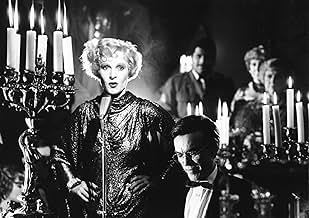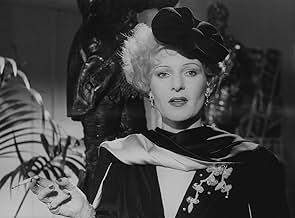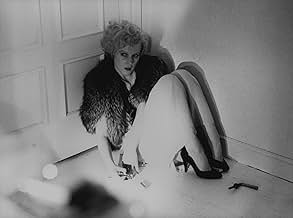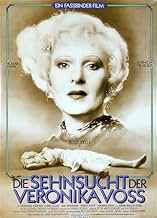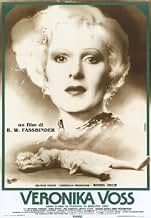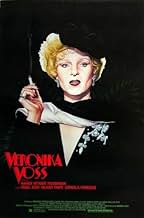IMDb-BEWERTUNG
7,6/10
8108
IHRE BEWERTUNG
WI fand Ruhm unter dem Nazi-Regime, aber Wald Karriere wurde danach zerstört, Veronika Voss ist eine einst prominente UFA Schauspielerin, gehalten von ihrem Arzt, wirft Verdacht in einem Spo... Alles lesenWI fand Ruhm unter dem Nazi-Regime, aber Wald Karriere wurde danach zerstört, Veronika Voss ist eine einst prominente UFA Schauspielerin, gehalten von ihrem Arzt, wirft Verdacht in einem Sportjournalist.WI fand Ruhm unter dem Nazi-Regime, aber Wald Karriere wurde danach zerstört, Veronika Voss ist eine einst prominente UFA Schauspielerin, gehalten von ihrem Arzt, wirft Verdacht in einem Sportjournalist.
- Regie
- Drehbuch
- Hauptbesetzung
- Auszeichnungen
- 4 Gewinne & 4 Nominierungen insgesamt
Günther Kaufmann
- G.I.
- (as Günter Kaufmann)
- …
Empfohlene Bewertungen
This movie left me feeling rather low. Its world is quite bleak. People are either strong or weak in the face of a society that feels cold. Looks like being strong won't make any difference in the long run. A very sad tale with beautiful black and white photography.
6sol-
Beautifully photographed in simple black and white, with some lovely gliding shots and some interesting camera angles and framing, the film is an amazement on a visual scope, even if the screenplay and acting are nothing special. Fassbinder's choice of lighting is excellent, giving true stark contrast between areas of black and areas of white in certain scenes. Sound is a significant aspect too, with soft radio recording heard in the background of just about every scene. The meaning behind such an audio style is not clear, but still it provides an interesting feel if not much else. As already alluded to however, the technical aspects outweigh the rest of the film. It is a rather cold tale with awkward characters, which are hard to sympathise with. Towards the end it also goes off on a bit of a tangent, from being a drama to a thriller. The film definitely seems more dedicated to its style than its substance, but that only makes is a certainly degree less fascinating to watch. The style quite literally sparkles and the film applies a few interesting editing tricks to change from scene to scene. If not involving as a tale, it is nevertheless great "eye candy".
A man runs into a pretty but aging woman in the middle of a rainstorm. He politely protects her from the downpour with his umbrella, and even lifts her over a fence so she can get to her bus. He also gets on the bus, and, beginning to pant, she declares that she can't go near anyone else on the bus, because she's a famous actress and she'll be thronged. The other passengers on the bus look up at the exasperated woman, but don't pay her any more mind than that. A bit later, the woman proudly tells the man that she is Veronika Voss, and all he can do is politely nod. She hasn't been in a movie for three years, and hasn't been in a good one for longer than that. Veronika has to try really hard to pin the man, Robert, down and seduce him, and even when she accomplishes this feat he doesn't seem particularly interested. Robert's interest does grow when he begins to discover some nasty secrets about her life, notably that she is addicted to morphine. A strange doctor seems to be little more than a local drug dealer when he begins to look into the situation.
The plot is decent; it would have been a really good one for a classic Hollywood film starring Joan Crawford or Bette Davis or someone like that. Its greatest worth is in the performance of Rosel Zech, who has the titular role. Cornelia Froboess as Robert's girlfriend and Annemarie Düringer as the wicked doctor are also good. The character of Robert is never very interesting. The black and white cinematography (Xaver Schwarzenberger) and the unconventional score (Peer Raben) are very good. The tape I watched was not in a very good condition, so I may have liked it more if I had seen a better copy. 8/10.
The plot is decent; it would have been a really good one for a classic Hollywood film starring Joan Crawford or Bette Davis or someone like that. Its greatest worth is in the performance of Rosel Zech, who has the titular role. Cornelia Froboess as Robert's girlfriend and Annemarie Düringer as the wicked doctor are also good. The character of Robert is never very interesting. The black and white cinematography (Xaver Schwarzenberger) and the unconventional score (Peer Raben) are very good. The tape I watched was not in a very good condition, so I may have liked it more if I had seen a better copy. 8/10.
A famous German actress, Veronika Voss (Rozel Zech) in her forties tries to revive her career while struggling with alcohol and drugs in the final chapter to Fassbinder's trilogy about collapse of the West German postwar dream. The film was inspired by the tragic life of famous UFA actress, Sybille Schmitz (1909-1955). She began her career in the films by the giants such Georg Wilhelm Pabst and Carl Theodor Dreyer and soon became one of Germany's beloved actress. Everything changed during the WWII and especially after its end.
Fassbinder's film which was shot in black and white visually is very impressive. "Light and shadows are two cinema's best secrets" says Veronika in the movie and light and shadows make the film a joy to behold. I like it but I think it is the weakest part of the trilogy perhaps because "Lola" and "Maria Braun" are so strong. I found the documentary about Sybille Schmitz, "Dances with Death" which is included on Criterion DVD much more compelling.
Veronika - 7/10 Dances with Death 8.5/10
Fassbinder's film which was shot in black and white visually is very impressive. "Light and shadows are two cinema's best secrets" says Veronika in the movie and light and shadows make the film a joy to behold. I like it but I think it is the weakest part of the trilogy perhaps because "Lola" and "Maria Braun" are so strong. I found the documentary about Sybille Schmitz, "Dances with Death" which is included on Criterion DVD much more compelling.
Veronika - 7/10 Dances with Death 8.5/10
10hasosch
Rainer Werner Fassbinder's second-but-last film does not show primarily the life and downfall of the UFA-star Sybille Schmitz, but gives, at the hand of the Schmitz-inspired, yet fictive character Veronika Voss an unvarnished and hopeless picture of the Bundesrepublik Germany in the 50ies. Part of Fassbinder's "BRD-Trilogy", it is also one of his 4 "women"-films, besides "Lola", "Maria Braun", and "Lili Marleen".
It is hard to say if the main focus of this movie is the former UFA-star Veronika Voss or the sports reporter Robert Krohn. One rainy night, he meets, in a little forest amidst of Berlin, a crying little bundle of mensch who seems to have completely lost her orientation. She is not so much thankful for his help but astonished that he does not recognize her: the great Veronika Voss. After he accompanies the woman to her door, she continues to occupy his mind. He asks his older colleagues who confirm him that she was once a movies' super-star, but now forgotten, divorced, impoverished, addicted and out of work. Soon, they meet again, and between Krohn, who is in a steady liaison, and Veronika, who sees in him one of her once many admirers, a very problematic love story starts which costs two humans' lives, leaves an investigative mind back in despair, discloses the corruption between medicine and politics and portrays the deterrent situation in the post-war German film industry which used his former flagships as fuel.
R.W. Fassbinder got for this films the "Golden Bear" out of the hand of Jimmy Stewart who was his friend for many years. Fassbinder had been nominated for the highest German film price since a long time, but it was Stewart who realized that soon it might come too late. Fassbinder passed away only a few days after having received the Golden Bear.
It is hard to say if the main focus of this movie is the former UFA-star Veronika Voss or the sports reporter Robert Krohn. One rainy night, he meets, in a little forest amidst of Berlin, a crying little bundle of mensch who seems to have completely lost her orientation. She is not so much thankful for his help but astonished that he does not recognize her: the great Veronika Voss. After he accompanies the woman to her door, she continues to occupy his mind. He asks his older colleagues who confirm him that she was once a movies' super-star, but now forgotten, divorced, impoverished, addicted and out of work. Soon, they meet again, and between Krohn, who is in a steady liaison, and Veronika, who sees in him one of her once many admirers, a very problematic love story starts which costs two humans' lives, leaves an investigative mind back in despair, discloses the corruption between medicine and politics and portrays the deterrent situation in the post-war German film industry which used his former flagships as fuel.
R.W. Fassbinder got for this films the "Golden Bear" out of the hand of Jimmy Stewart who was his friend for many years. Fassbinder had been nominated for the highest German film price since a long time, but it was Stewart who realized that soon it might come too late. Fassbinder passed away only a few days after having received the Golden Bear.
Wusstest du schon
- WissenswertesBased on the true story of German film star Sybille Schmitz.
- PatzerThe film is set in 1955 but the song "The Battle of New Orleans" by Johnny Horton, released in 1959, is heard on the radio a number of times.
- Zitate
Dr. Marianne Katz: Artists are different from ordinary people. They are wrapped up in themselves, or simply forgetful.
Top-Auswahl
Melde dich zum Bewerten an und greife auf die Watchlist für personalisierte Empfehlungen zu.
- How long is Veronika Voss?Powered by Alexa
Details
- Erscheinungsdatum
- Herkunftsland
- Sprachen
- Auch bekannt als
- Veronika Voss
- Drehorte
- Produktionsfirmen
- Weitere beteiligte Unternehmen bei IMDbPro anzeigen
Box Office
- Budget
- 2.600.000 DM (geschätzt)
- Bruttoertrag in den USA und Kanada
- 8.144 $
- Eröffnungswochenende in den USA und in Kanada
- 11.623 $
- 16. Feb. 2003
- Weltweiter Bruttoertrag
- 8.158 $
- Laufzeit1 Stunde 44 Minuten
- Farbe
- Sound-Mix
- Seitenverhältnis
- 1.66 : 1
Zu dieser Seite beitragen
Bearbeitung vorschlagen oder fehlenden Inhalt hinzufügen

Oberste Lücke
By what name was Die Sehnsucht der Veronika Voss (1982) officially released in India in English?
Antwort
